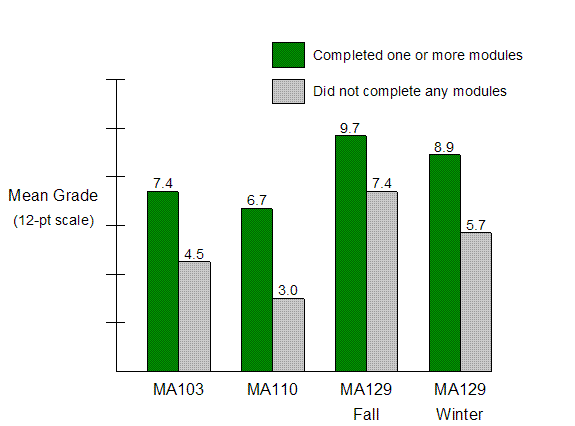Opportunity
David Vaughan, a professor in the Mathematics Department at Wilfrid Laurier University in Waterloo, Ontario was concerned that many of the students taking first-year calculus did not have adequate mastery of some of the key concepts and techniques in high-school mathematics, including algebra and geometry. As well, the students’ more passive learning style was not appropriate for facing the active learning challenges in mathematics at the university level.
To address the need for both enhanced mathematical knowledge and ability and more active learning strategies, Dr. Vaughan, with the assistance of Tina Balfour, the Coordinator of the Mathematics Assistance Centre, developed self-directed online modules that reviewed the key prerequisite material for first-year calculus.
Innovation
At present, the Supplementary Module Program for Calculus consists of eight modules containing review material from secondary school level mathematics, offering students the opportunity to review and demonstrate mastery of:
- Numeric expressions
- Algebraic expressions
- Rational expressions
- Solving equations and inequalities
- Geometry
- Functions and graphing
- Exponentials and logarithms
- Trigonometry and trigonometric functions
Each module has four to seven assignments, supplemented with reference notes, plus a test for credit. Within a module, students have to attain a mark of 80% or higher on each assignment before they can move on to the next – but they can try the assignment as many times as they wish. Drop-in support is available through the Mathematics Assistance Centre. When a mark over 80% has been achieved on each assignment, the student may attempt the final test for the module. This also requires 80% for successful completion and can be attempted as many times as necessary for success. The students learn through their mistakes.
Each module is available for a restricted period of time to encourage the students to work through them early in the course. The questions are randomly generated from a test bank so memorization and exchange of responses are not possible.
Completion of the modules is optional, but students can get up to a total of five bonus points towards their final grade for completion of five of the modules. The participation rate is rising – in 2011-2012, 64% of students completed at least one module, an increase from 46% in 2010-2011. Usage of the modules has been steadily increasing – the one year they were required rather than optional had the lowest participation rate.
The test bank of over 1,500 questions was created over one summer by Tina Balfour. The principles being tested remain consistent but the questions and the numbers within the calculations are randomly generated for each assignment and test. The software program, MapleTA, provides the grading.
Outcomes and Benefits
The modules give the students the opportunity to learn at their own pace and to keep working at the problems until they achieve a grade of at least 80%. This allows them to achieve mastery of concepts and skills, providing an invaluable basis for future work in mathematics.
For students who earned five bonus points by completing five modules, a slight increase in final marks might be expected. In fact, students who complete one or more modules have results that are substantially higher than can be explained simply by those additional marks. The graph below indicates the difference in results – often more than three full grade points on Laurier’s 12-point grade scale – in the 2010-2011 academic year.

The results for academic year 2011-2012 show grade point scores up to four full points higher for students who completed at least one module. The final grades from 2011-2012 also indicate the impact of the modules, with A being the dominant grade for those who had completed at least one module, particularly for those who completed five or more. In another demonstration of the success of the modules, at-risk students – defined as those with high school mathematics results lower than 80% – who completed the modules had final results in first-year calculus similar to those of the rest of their classmates.
As the modules are completely online, completing them is a new experience for many students, who must be independent and responsible for their own learning. None of this material is covered in class – these are for remedial purposes only – and so the students complete them on their own time. They may take advantage of the support offered in the Mathematics Assistance Centre, but this is also at their own initiative. Skills in both mathematics and in accountability for learning are enhanced.
Students are expressing their appreciation for the modules in the end-of-term feedback surveys conducted by the Mathematics Assistance Centre.
Challenges and Enhancements
Doing mathematics online is not as user-friendly as it might be. The challenge of working with the technology and the requirement to input answers exactly and in the correct format frustrates some students.
Potential
The modules are available to students in three introductory calculus courses and a specialized one for science students. However, there are many other areas where discussions are underway concerning the use of the modules – or adaptations of the module model – to enhance mathematics learning:
- Modules could be designed as prerequisites for second-year math courses, as reviews of first-year concepts.
- Courses on Linear Algebra and on Mathematical Proofs could be enhanced with modules offering additional practice and work with the basic concepts.
- Other faculties with statistics and research methods courses are looking for cost-effective ways to support their students and ensure they have the necessary skills – and have been considering the model of the modules as a possible effective approach.
For Further Information
David C. Vaughan
Professor, Mathematics,
Associate Dean, Priorities and Planning
Faculty of Science
Wilfrid Laurier University
Waterloo, Ontario
[email protected]
D. Marc Kilgour
Professor, Mathematics
Chair, Department of Mathematics
Faculty of Science
Wilfrid Laurier University
Waterloo, Ontario
[email protected]
Tina Balfour
Coordinator
Mathematics Assistance Centre
Learning Services
Wilfrid Laurier University
Waterloo, Ontario
[email protected]


